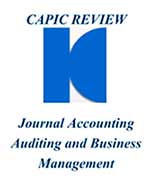Published 2015-12-10
Keywords
- conservatism,
- accouting information,
- IFRS,
- accouting equity,
- qualitative research
How to Cite
Abstract
The concept of prudence or conservatism has been studied in various investigations both from a theoretical perspective, and their practical application in the disclosure of accounting information: Basu [(1997), (2005)], Pope and Walker (2003), Watts (2003), Beaver and Ryan (2005), Brown et al (2006), Garcia Lara and Mora (2004), among others.
While, the IASB has modified its framework in 2010, eliminating the concept of prudence, despite
still existing prudential practices are governed by their own rules (regulatory conservatism).
That concern over the issue is also appreciated in the literature review we have done, which evidenced by studying how variables empirical research, are apparent in the disclosure in the notes to the financial statements of different entities in different countries This has motivated us to conduct a study on how to materialize the conservative criteria that can be seen in the issuance of reports of economic and financial reality of the entities in Chile.
For this reason, this research is qualitative based on observation of revealed and stories of how they are expressed in the notes to the financial statements useful background for assessing the effects of the conditional and unconditional conservatism information is performed.
This review was conducted in 10 publicly traded companies classified in the IPSA, which were considered key informants.
We conclude that there are various ways to reveal attitudes or conservatism in Chile, which is evident in the emphasis that companies show to publicize the information in the notes to this fact, as in the formats used in the various annual reports those entities.
Downloads
References
2. Ball, R., Robin, A., Sadka, G., 2008. Is financial reporting shaped by equity markets or by debt markets? An international study of timeliness and conservatism. Review of Accounting Studies, 13 (2-3), 168-205.
3. Basu, S. (1997) The conservatism principle and the asymmetric timeliness of earning. Journal of Accounting and Economics, 24: 3-37.
4. Basu, S. (2005) Discussion of “conditional and unconditional conservatism: concepts and modelling” Review of Accounting Studies, 10 (2/3), 311-321.
5. Beaver, W.H. and Ryan, S.G. 2005. Conditional and Unconditional Conservatism: Concepts and Modelling. Review of Accounting Studies, 10 (2/3), 269-309.
6. Brown, W.D., Haigong, H., and Teitel, K. (2006) Conditional Conservatism and the value relevance of accounting earning: an international study. European Accounting Review, 15 (4), 605-626.
7. Cabo-Moreno, I., Bautista-Mesa, R., Molina- Sánchez, H., Ramírez-Sobrino, J. El papel de la contabilidad ante la crisis financiera. Una reflexión sobre el conservadurismo incondicional de la NIIF 9. Cuadernos de Contabilidad, 15 (38): 371-395, julio-diciembre 2014. Bogotá, Colombia.
8. Federación Argentina de Consejos Profesionales de Ciencias Económicas (FACPCE) (2012) Resolución Técnica N° 16. Argentina: Errepar.
9. García Lara, J., García Osma, B. and Mora, A. 2005. The effect of earnings management on the asymmetric timely of earnings. Journal of Business Finance and Accounting, 32 (3/4), 691-726.
10. Garcia Lara, J.M., and Mora, A. (2004) Balance sheet versus earning conservatism in Europe. European Accounting Review, 13 (2), 261-292.
11. Gebhart, G., Mora, A., and Wagenhofer, A. (2014) Revisiting the Fundamental Concepts of IFRS. Abacus, 50 (1), 107-116.
12. Iñiguez, R., Poveda, F., Vázquez, P. (2013) Evolución del conservadurismo de balance con la implantación de las Normas Internacionales de Información Financiera: aplicación al caso de España. Revista Española de Financiación y Contabilidad. XLII, N° 60, octubre-diciembre 2013, pp.453-486.
13. Mejías, J.F. (2011) La crisis de la prudencia en la convergencia contable internacional: Una mirada desde los deterioros de valor y las provisiones. Textos de Contabilidad Publica N° 8, 67-95. Colombia.
14. Mora, A., Walker, M. (2015) The implacations of Research on Accounting Conservatism for Accounting Standards Setting. Conferencia en II Workshop Iberoamericano de Investigación Empírica en Contabilidad Financiera. Abril 2015, Universidad Nacional de Rosario, Argentina.
15. Patiño, L., Rojas, M. (2005) Métodos y enfoques en la investigación cualitativa. Colombia: Ed. El Poira Editores S.A.
16. Pita Fernández, S., & Pértegas Díaz, S. (2002). Investigación cuantitativa y cualitativa. Cad Aten Primaria, 9, 76-8. Accedido el 17 de agosto de 2015 en http://www.fisterra.com/mbe/investiga/cuanti_cuali/cuanti_cuali.asp
17. Pope, P. and Walker, M. (2003). Ex-ante and expost accounting conservatism, asset recognition and asymmetric earnings timeliness. Working Paper. Lancaster University and University of Manchester UK.
18. Ruz Farías, V. (2008). Una doctrina sobre las IFRS. Chile: RR Donnelley.
19. Silva, B. (2012) La información financiera y la importancia de su revelación. Octubre 2012. Accedido el 31 de mayo de 2015 en http://www.researchgate.net/publication/259471185_LA_INFORMACIN_FINANCIERA_Y_LA_IMPORTANCIA_DE_SU_REVELACIN
20. Urreola, R (2011) Integración y/o Confrontación de las Perspectivas Cualitativas y Cuantitativas en Investigación. Revista Razones Académicas. Publicación Digital de la Universidad ICEL, República del Ecuador. Año I Número 2 enero. Accedido el 11 de agosto de 2014 en http://www.icel.edu.mx/pdf/razonesacademicas/razonesacademicas02/files/razones%20academicas%202a(1).pdf#page=11
21. Watts, R.L. (2003) Conservatism in accounting Part I: Explanations and implications. Accounting Horizons, 17 (3), 207-221.


































